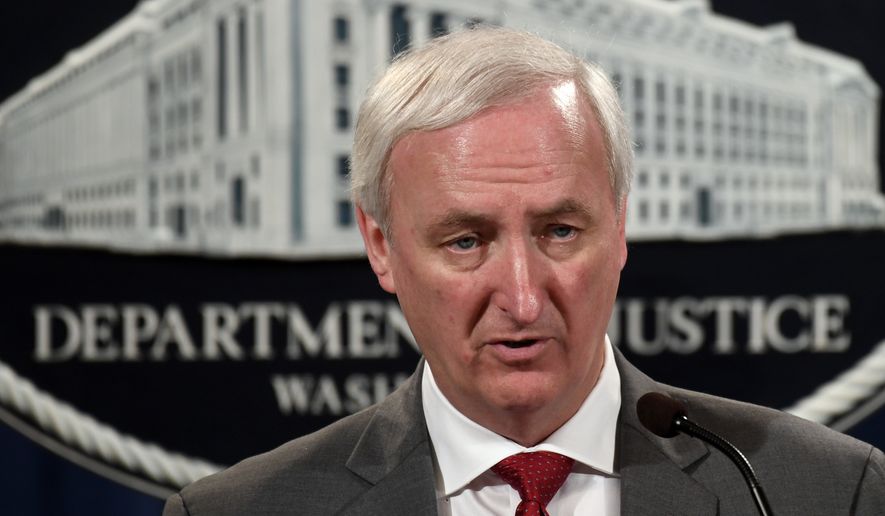Deputy Attorney General Jeffrey Rosen on Thursday accused left-leaning news organizations of deliberately spreading “disinformation” about the Trump administration’s views of the dangers from mail-in voting and foreign influence in the 2020 elections.
The resulting confusion has helped create an opening for America’s adversaries like Russia and China to exploit, Mr. Rosen told The Washington Times.
“It’s important to remember that there are times when drawing attention to the threats can be precisely what the bad actors want — to generate concern and distrust, division and discord,” he said. “As Americans, we need to avoid the temptation to seek political advantage from the revelation of influence activities that were meant to divide us.”
U.S. intelligence agencies have not found evidence of foreign adversaries targeting mail-in votes, according to administration officials.
But news reports linking mail-in voting and foreign influence campaigns are giving ammunition to bad actors intent on deepening the country’s divisions, he said.
“Common sense would tell you that the risk associated with mail-in ballots to unknown addresses or people who didn’t ask for them is a different risk than the Election Day infrastructure,” Mr. Rosen said.
Foreign influence campaigns pose a risk to elections through covert, corrupt, and coercive activity affecting candidates, campaigns and political groups, and are relatively inexpensive. Authoritarian regimes such as Russia and China have spent more than $300 million interfering in democratic processes across 33 countries in the last decade, including a dramatic uptick since 2016, according to an August report from the Alliance for Securing Democracy at the German Marshall Fund.
Mr. Rosen said new efforts by the Justice Department, FBI, Office of the Director of National Intelligence, and other federal agencies have overhauled how the government addresses foreign influence efforts and what it makes public.
Federal law enforcement and intelligence community officials have met regularly with Big Tech and social media companies such as Google, Facebook and Twitter to brief them on the upcoming election. Where appropriate, the federal government has privately briefed technology companies, candidates, and campaigns about existing threats.
The focus on existing threats over hypothetical disaster planning belies the notion that the Trump administration’s briefings are singularly focused on future events.
“We coordinate with social media companies and others to share information to help them do what they want to do. We don’t necessarily say ’you have to do X,’” Mr. Rosen said. “We’re not censors but we’ll say, ’you should know this or that’ and we provide more briefing-type information.”
Mr. Rosen was mum on specific examples of what foreign influence efforts looked like in 2020, and noted that sharing details of what has been discovered may prove counterproductive by amplifying adversaries’ malicious messages.
Following briefings disclosed by the federal government and technology companies earlier this month, some tech titans such as Facebook took action to shutter thousands of accounts related to leftist anarchists such as Antifa and right-leaning conspiracy theorists identifying as QAnon.
The problem posed by foreign influence campaigns is not hypothetical.Last week, the Justice Department’s Office of Legislative Affairs revealed how foreign adversaries attempted to purchase influence with failed Democratic presidential candidate Hillary Clinton’s 2016 campaign.
An unnamed foreign adversary looked to purchase influence with Mrs. Clinton through “lobbying efforts and campaign contributions,” including outside the traditional means of making such donations, according to FBI documents on the bureau’s counterintelligence briefings to Mrs. Clinton’s attorneys.
• Ryan Lovelace can be reached at rlovelace@washingtontimes.com.




Please read our comment policy before commenting.